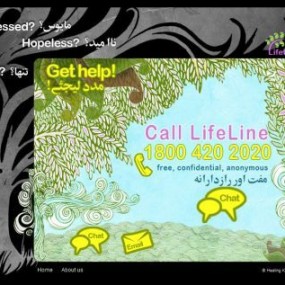
Few people in Kashmir are ready to come up with their problems they face at mental level. It is a grim reality established by the wide research conducted by various experts groups and individuals that the people of Kashmir have been swept over by serious psychological and mental problems over the years of turmoil.
But what ails them more is that they feel shy of expressing themselves in front of the doctors.
“We researched a lot about the Kashmir conflict and its impact on the population. The problem is that people here are not willing to come forward. It is unfortunate that lot of stigma is attached to psychological related problems in Kashmir,” says senior counselor, Feroz Malla at Kashmir Life Line.
Kashmir life line is a part of Healing Kashmir, a project started by the Justin Hardy, a UK based journalist-cum psychologist, to provide mental care to thousands of people in Kashmir who have suffered in the raging conflict.
Workers with Kashmir Life Line say that social stigma factor prompted them to start an email, chat and phone service to enable interaction and counseling sessions for people, mostly girls and women, who are otherwise hesitant to attend our camps in person.
The email, chat and Phone service were started way back in June 2010 as Kashmir Helpline.
“Response is very good. Sometimes we 30 calls a day, seven to eight people chat every day and we encourage people to talk about their problems,” said Arif Margoobi, a consultant Psychiatrist at Kashmir Helpline.
People want to share their stories with someone. They want somebody to sympathize and empathize with them. Doctors at the center say that youngsters mostly talk about the exam failures and break up in relationships.
Margoobi mentioned that the chat, phone call or emails are highly confidential and no questions about residence , name or other details about the patients are asked.
“Our main motive is to solve the problem. We don’t care about the identity. Even during chatting, we don’t know who is on the other side—girl or boy, nor do we ask for it. They can change their Ids,” he said
On the question of how they counsel the callers, or social networking users, he said, “we try to give them confidence that everything would be fine. Most of the patients have a sense of guilt after failure in relationship, studies and business; we empathize with them. We try to be friends to them, who are ready to listen to them. Some of them have very high suicidal tendencies, our primary target is to bring that down first, and then we gradually try to encourage him or her for other things,” said, Malla.
Doctors at the center also say that once they gain the confidence of these people over phone or chat, most of them are then willing to visit the centers.
One of the callers Adil Bhat, who later attended the center after being counseled on the phone, shared his experience.
“I was very distressed after my relationship with a girl ended and was struggling with suicidal thoughts. One had after reading about his NGO on the internet; I called at the toll free number on the impulse. It has proved very helpful and now I encourage others to join the center for unburdening the agony one is going through,” said Bhat who visits one center regularly.
Zahid Maqbool is a freelance journalist based in Srinagar.


